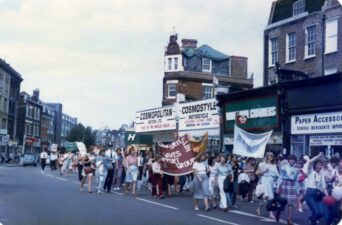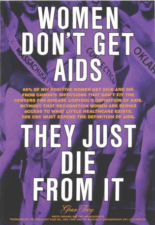Amanda Markwell

I have never been so close to anything so sad or ugly as this and I don’t think I ever knew so clearly before why women need political equality and complete re-adjustment of their position.[1]
Dr. Louisa Garrett Anderson smuggled these words from her cell in Holloway prison. On 4 March 1912, she risked her personal and professional reputation by breaking a window of a house in Knightsbridge. This protest, at a speech given by the anti-suffrage MP Charles Hobhouse, resulted in Garrett Anderson receiving a sentence of six weeks hard labour.[2] In general histories of the suffrage movement Louisa Garrett Anderson’s name is rarely mentioned. If it is, the reader is reminded how she had followed her pioneering mother into the medical profession, not of her own achievements.[3] Louisa Garrett Anderson was born into a women’s movement dynasty.[4] She grew up in an atmosphere of hard won fights and causes. No doubt there was some expectation that she would join in the fight for women’s emancipation. However, her personal involvement in the suffrage cause allowed Louisa Garret Anderson to have a different understanding of political activism than her family, finding her own political voice.
The news that Louisa Garrett Anderson had been arrested made many newspapers in March 1912. Garrett Anderson undoubtedly realised that her standing would be slightly more secure than that of others due to her heritage. However, this type of activism would have been very different from the constitutionalist campaign that the Garrett family had been part of for most of her life. That she had carefully weighed both her actions and the likely consequences to her reputation beforehand is shown clearly in one of her letters smuggled out of prison,
If one enters a rebellion, one does it deliberately and shd be ready to face the consequences calmly.”[5]
In their insistence on full political prisoner status, suffrage prisoners repeatedly petitioned the Home Office for pen and paper, largely in vain. Illicit letters therefore are evidence of suffrage prisoners responding to the control of the criminal justice system by making their experiences visible.[6] Louisa Garrett Anderson’s smuggled letters to her mother perhaps give us her true feelings about finding herself in a situation “…of sadness and hopelessness; of joy and conviction and hope.”[7] The letters from prison show a woman clear in the wider purpose of the vote, and the meaning of the campaign.
It seems just a bit of good luck to come to Holloway to fight against conditions of life which are so hard for women, instead of coming here because one has been pushed under by them.[8]
Prison, enabled her to understand how different classes of women were treated. The suffrage campaign aimed to redefine and recreate the sexual culture of Britain.[9] When suffragist Kate Gliddon was imprisoned, she suggested that to fully understand the need for social and political change one must have personal encounters with women across social boundaries.[10] We can see that this was the case with Louisa Garrett Anderson,
The vast proportion…are here for petty theft connected with street walking! Charged by the men who have used them! No outside evidence being given. It is too hideously mean, isn’t it? In itself ample reason for being a suffragist.[11]
Although sentenced to six weeks with hard labour, Garrett Anderson did not serve her full sentence. Her imprisonment had further distanced her political activism from that of her families. In a letter to the Prison Commissioners, her brother stated “…her immediate family circle oppose her militant methods of argument…”[12] Alan Garrett Anderson attempted to get his sister’s sentence ended early so she could “…have a few days of quiet with her mother…” then “…as the halo of martyrdom faded she would be helped to regain her mental balance.”[13] These extraordinary words link strongly to the understanding that many women in the suffrage campaign had allowed their “…minds, not trained to consider, to create, to philosophise…to become unhinged.”[14] They seem even more extraordinary when we consider the Garrett families history in the women’s movement. It perhaps shows the horror many people believed would happen if women were successful in their political aims. Women who understood that the gaining of the suffrage could totally transform women’s lives were a threat to the social order of the day. The idea that Garrett Anderson’s family was against her personal way of being political shines a bright light on how dangerous women fighting for the suffrage were perceived to be.
Garrett Anderson herself was clear why she, unlike her “…fellow gaol birds.” had been released early “…the Home Office found that I might like to spend Easter with my family.”[15] She understood that her name had made her life in prison different to the other women.[16] The inconsistency in sentencing also pointed to her family influence. A working woman had caused 3s worth of damage and sentenced to two months hard labour. Whereas the damage Garrett Anderson had caused was estimated to be 30s, for which she received six weeks reduced by family intervention to one month.[17] She understood therefore that many women were there because of a society in which poverty and status left them little option. This could change if society itself was willing to give women the vote. In a piece published in Votes for Women it seems that her family had not succeeded in helping her “…regain her mental balance.”[18] If anything her political views had become crystallized by her time in Holloway and her indignation at being questioned about going to prison for the movement is palpable,
In prison…the need for altering the status of women is so obvious that I do not think the dullest could fail to see it…It is not the vote we want or a certain number of votes. We care about the votes because it is a symbol of equality. What we want is to make men and women understand that a woman is a human being worth as much as any human being.[19]

[1] WL 7LGA/1/2/6.
[2] WL 7LGA/1/1 in a report from the Daily Telegraph, Hobhouse suggested that he did not consider the Suffrage agitation was supported by popular feeling because women were not causing the same kind of damage as men did during the 1832 Great Reform Riots.
[3] Elizabeth Garrett Anderson became the first woman to qualify in medicine in the British Isles. In 1870 she obtained her MD from Paris and became the first female doctor. http://www.oxforddnb.com.login.library.ucs.ac.uk/view/article/30406 accessed 10 April 2015.
[4] According to Jenifer Glynn the Garrett sisters and cousins naturally and amicably evolved into their chosen spheres of work for the women’s movement see J.Glynn, The Pioneering Garretts:Breaking the Barriers for Women, (London, 2008), p.114. A book that barely mentions Louisa Garrett Anderson.
[5] WL 7LGA/1/2/2
[6] A.Schwan, ‘Bless the Gods for my Pencils and Paper’, p.150; on the top of a letter dated 26 March from Louisa Garrett Anderson to her mother are the words “Please do not mention my letters if you write.” A clear indication that these are illicit. WL 7LGA/1/1.
[7] WL 7LGA/1/2/4.
[8] WL 7LGA/1/2/4.
[9] Susan Kingsley Kent, Sex and Suffrage in Britain 1860-1914, (London, 1990) p.3.
[10] A.Schwan, ‘Bless the Gods for my Pencils and Paper’, p.156.
[11] WL 7LGA/1/2/2.
[12] WL 7LGA/1; HO 144/1193/220196 (1-233) Disturbances: Suffragettes’ Demonstration. Imprisonment. Forcible Feeding.
[13] WL 7LGA/1; HO 144/1193/220196 (1-233) Disturbances: Suffragettes’ Demonstration. Imprisonment. Forcible Feeding.
[14] ‘Epidemic Hysteria’, The English Review, July 1914.
[15] Votes for Women, 26 April 1912; WL 7LGA/1/2/1.
[16] In one of her letters Garrett Anderson mentioned how she had been moved to “a lighter and better cell in which there is a little air” WL 7LGA/1/2/4.
[17] Votes for Women, 26 April 1912.
[18] WL 7LGA/1; HO 144/1193/220196 (1-233) Disturbances: Suffragettes’ Demonstration. Imprisonment. Forcible Feeding.
[19] Votes for Women, 26 April 1912.
Images from bing.com/images/search.
Amanda Markwell is a recent history graduate from University Campus Suffolk. Her thesis featured Louisa Garrett Anderson. Amanda is currently employed by the Suffolk City Council as a researcher.


